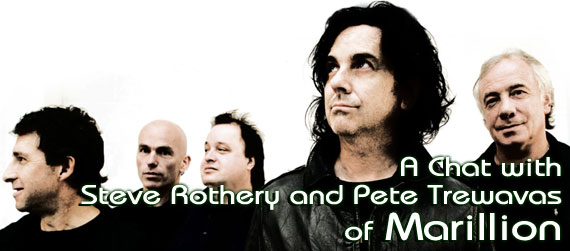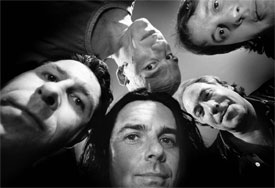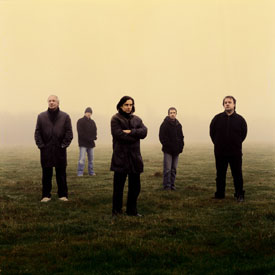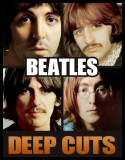
04/26/2007
Music Home / Entertainment Channel / Bullz-Eye Home
They were founded in 1979 and have released 14 albums in their career to date, but Marillion still struggles to find a truly solid foothold on the shores of America. You may remember the band from the first segment of their career, when they tasted cult success with the single, "Kayleigh," and a man named Fish fronted the band. Since 1988, however, Marillion's lead singer has been Steve Hogarth, and he and the rest of the group continue to produce solid albums, producing a unique blend of pop, pomp and progressive rock. Bullz-Eye had the opportunity to chat with one of Marillion's founding members, guitarist Steve Rothery, as well as bassist Pete Trewavas (who has been with the group since '82). They talked about that 14th album – Somewhere Else – as well as their unfortunately low profile in the States, the evolution of the band, and how they have "the best fans in the world."
Bullz-Eye: Hi, guys!
Steve Rothery: Hi, how's it going?
Pete Trewavas: Hi, there!
BE: I've been a fan of the band in general since (1985's) Misplaced Childhood, but I've been a fan of the new incarnation ever since the first time I heard "Cover My Eyes (Pain and Heaven)" (from 1991's Holidays in Eden).
SR: Right, right.
PT: Excellent.
BE: Actually, the not-very-new-anymore incarnation, I should say.
SR: Yeah, we know.
PT: Yeah, it's been a few years! But go ahead.
BE: What would you guys say that fans can expect from Somewhere Else? Do you feel that you've gone in a particularly different sonic direction this time around?
SR: Well, it's a new producer we used – Michael Hunter – this time, who mixed quite a few of the tracks from (2004's) Marbles. But he's younger than Dave Meegan (who produced Marbles), he's a musician himself, and he's a great engineer. He's produced bands like Mansun and Alfie. So he's brought a fresh approach, I think, to what we do. We sound more like a live band performing in a room. Dave Meegan's approach was a lot more sort of to build up lots of layers and textures.
PT: Yeah, I mean, what Mike wanted to try and stress to us was that we should try and play as live as possible, and just capture the essence of what we do well.
SR: There's a lot less overdubs, probably, on this album, and a lot less editing, actually. Like, on the drum tracks, it's a lot more of a band performance than anything we've done in a long time.
BE: Your profile in the States hasn't exactly been chart-topping of late, although it really wasn't even that way back when Fish was fronting the band.
SR: No. (laughs)
PT: A great loss, we feel!
SR: Exactly! You know, we know there would be an amazing audience for what we do here if people were exposed to it, but, y'know, we kind of resign ourselves a little bit to being a cult band. I mean, the American fans we have, if for any reason we can't get over, they tend to come to us these days!
PT: Yeah. I mean, they're as passionate about us as the rest of our fans in Europe and everywhere else. But it's a vast country, and for some reason, we've never managed to capture the whole place.
BE: Well, I know the U.S. fans were essentially the reason you were able to tour behind (1997's) This Strange Engine in the States!
PT: That's right!
 SR: That's right, yeah, back in '97, really, when
they started the tour fund and raised $60,000! But, you know, you don't
want to be doing that every time! We came with Marbles, and
we came with the acoustic set a couple of times, but the problem is
that it's just very, very expensive for us to come here. Just, like,
visas now are very expensive. And the exchange rate really hurts us
at the moment. But I like to think that we can come back. I don't know
if it'll be this record or this next record, but any way possible,
we'll be back.
SR: That's right, yeah, back in '97, really, when
they started the tour fund and raised $60,000! But, you know, you don't
want to be doing that every time! We came with Marbles, and
we came with the acoustic set a couple of times, but the problem is
that it's just very, very expensive for us to come here. Just, like,
visas now are very expensive. And the exchange rate really hurts us
at the moment. But I like to think that we can come back. I don't know
if it'll be this record or this next record, but any way possible,
we'll be back.
PT: Yeah, I think it's too big a market to neglect, really, however we decide to do it. But we should always try and have some presence here in the U.S.
BE: Actually, I was going ask this anyway. After Steve (Hogarth, who replaced Fish) joined the band, you ended up doing quite a bit of label-bouncing here in the States. Do you think that the bouncing from label to label was the cause for you not really growing in popularity at that point, or was it just the musical climate at the time?
SR: Not really. It's just that we haven't had much luck here whatsoever! I mean, in the early days, with Capitol, they didn't really achieve much, considering what all the other EMI companies were doing around the world with Misplaced Childhood and (1987's) Clutching at Straws. It didn't really get away over here.
PT: I think the big problem we always had was that EMI were very adamant that Capitol should take us and doing something with us, and they didn't really understand us.
SR: They didn't really want us.
PT: They were just told that they had to market us one way or another.
SR: And I.R.S. did a reasonable job for awhile, but then they kind of seemed to lose the plot -- I think probably when we gave them (1994's) Brave! (laughs) We killed their interest! But, you know, we're a hard band to market in some territories. Maybe it's rather easier these days, with the whole growth of the internet, and the way the music company promotes things through MySpace. Maybe there's a way that we can finally achieve more than we have in the past. But we'll have to see, really.
BE: You guys actually had a download-only single, a live version of "The Damage," before download-only singles were cool, which resulted in major P.R. for the band.
SR: Yeah, well, we've kind of been on the cutting edge, really, of developments in the internet and the music business. With the situation that we've got with the new album, it's a main worry for artists and record labels these days that, as soon as you send out promo copies of the record, there's a very good chance that one these is going to be passed to somebody that's gonna put "em on one of the file-sharing networks weeks, if not months, before the record's in the shops. It's debatable on how much it hurts – I think it depends on the artist, really – but I think…
PT: It has an impact on sales.
SR: Yeah, it has a major impact on your overall sales. So that's something that we've guarded against with this record. Journalists can stream it online, but on the whole, they haven't had physical copies in their hands. It's because we have to be so careful about it nowadays.
"(American fans) are as passionate about us as the rest of our fans in Europe and everywhere else. But it's a vast country, and for some reason, we've never managed to capture the whole place." – Pete Trewavas BE: I won't lie to you, though -- having to listen to the voice intoning over the solos in just about every song, "This is an advance promotional copy that is not intended for distribution," kind of made me twitch.
SR: (shrugs) Yeah, yeah…
BE: I mean, I understand it's something you feel has to be done, but…
PT: It's either that or a copy with marks on it, yeah.
BE: You guys are really, sound-wise, not even the same band that you were when you started. Does it bother you that a lot of the older people who knew you from songs like "Kayleigh" still think of you in those terms today?
SR: Uh, it doesn't bother us, really. It's part of the history and the tradition of the band, really. I think there's still a lot of the same musical energy and passion there in the band. We've all just evolved as musicians and writers, and, obviously, when Steve joined back with (1989's) Season's End, it's an extra musician making a contribution to the whole creative process. So that's just how it goes. I mean, the important thing for a band like us is that, with every album, we try to make it a little bit different. We try to keep it fresh and interesting. Which, when you've made 14 albums, is quite a challenge, actually.
PT: That's true, yeah.
BE: A lot of online reviews of your recent material have tried to clarify the major difference in sound, making comparisons to bands like Radiohead and Keane. I know you guys actually recorded a cover of "Fake Plastic Trees" a few years back.
SR: That's right.
PT: Yeah, yeah, we did.
SR: Yeah, all those sort of bands like Radiohead, Keane, and even Coldplay to a certain extent, they've got a sort of progressive element, I suppose, in how they work and how they write. But, yeah, I can see those comparisons occasionally. But, on the whole, I think we are still very much in our own little corner of the music business universe.
BE: I was looking on the website, and, Steve, I see that one of your favorite albums is Jellyfish's Bellybutton.
SR: Yeah! Yeah, that's a great record.
BE: And you also picked a Crowded House…well, actually, both of you picked Crowded House albums as favorites!
PT: Yeah!
SR: Yeah, we played both a Jellyfish and a Crowded House song a few weeks ago. We have these fan club conventions in Europe, and we had one in Holland about three or four weeks ago -- we have about 3,000 people who fly in from all around the world for these things, and we play three concerts over the three days -- and on the Saturday night, we played Marillion rarities and cover versions. And one of the cover versions was Jellyfish's "The King is Half-Undressed," and another was Crowded House's "She Goes On."
BE: Wow. You know, there's actually a guy on MySpace who's putting together a Jellyfish tribute album. Maybe you should join in.
SR: They were a great band. It's a shame that they didn't achieve more success than they did, really. I mean, I know there were personnel changes after the first album, but that first record, especially, for me...it's such a classic record.
PT: I think they're both quite good, actually. The second record…it's quite different, but it's still got a lot going for it.
BE: They're wearing their Queen fan badge a bit more prominently on that one.
B: Yeah, they were, definitely! There was a bit of that influence.
BE: Do you think that the pop influences you guys have been embracing are the reason the band's sound seems to be less prog and more pop these days?
SR: Um, well, you know, we've always had those two elements within what we do. I mean, with Marbles, on one hand you've got "The Invisible Man" and "Ocean Cloud," and on the other hand, you've got "You're Gone."
PT: "Don't Hurt Yourself"
SR: It's good to have variety on a record. You don't want to just have variations on one track throughout an entire record. It helps the pacing of a record if you change between the longer, atmospheric pieces and the shorter, more confined and melodic pieces. I mean, we could never be a pop band. We're not really coming from that general direction. But, yeah, we've had a little bit more concise structures.
BE: So I guess (1999's) Marillion.com was kind of a turning point for you, sales-wise, the moment when you officially went indie.
"The important thing for a band like us is that, with every album, we try to make it a little bit different. We try to keep it fresh and interesting…which, when you’ve made 14 albums, is quite a challenge, actually.” – Steve Rothery SR: Yeah, well, actually, This Straight Engine was…the three indie albums we did were This Strange Engine, (1998's) Radiation and Marillion.com. But what we did with Marillion.com was that we had a mailback card in it, where we could start collecting people's mailing addresses. Because for a band in our position, the more direct contact we have with fans, the better, to let people know what you're doing for live concerts, for upcoming releases. And our whole internet and mail-order side of what we do is probably one of the reasons why the band is still making records, really. It gives us so much independence. We don't have to follow the normal route that you do when you sign a major label, where they give you an advance, you make the record, and hopefully one day you'll recoup and make some royalties. But we make royalties from the first record we sell!
BE: I was going to say, I figured that the indie route would prove far more financially lucrative.
SR: Yeah.
PT: It was, but we also found…we realized at Marillion.com that it was the last record of that contract, period, and we weren't really sure what we'd do after that, which is why we did the whole thing with the pictures on the front, and the mailback cards and everything, just to give ourselves somewhere to go if we wanted to be even more independent. Which is what we'd been meaning to do. We're gradually getting there, but we do more and more ourselves these days.
BE: Pete, you're also a member of Kino.
PT: That's right.
BE: How did Picture do for the band?
PT: Uh, it was small. It was quite well-received in the areas where it was received. For my liking, it was pigeonholed as a progressive rock album too much for me. What we tried to do was write a mainstream rock album. We just had good songs on it. But, of course, everybody picked up on the fact that John Beck's from It Bites, and I'm from Marillion, and they kind of put two and two together and made five, really, which was a shame, because once you've got that progressive pigeonhole, a lot of other areas of music won't touch you with a bargepole.
BE: And, Steve, have you had any other thoughts about another solo album?
SR: Uh, actually, I'm three-quarters through a second Wishing Tree album, so it's only taken me 10 years. (laughs)
PT: Well, you can't rush these things.
 SR: No, you can't. Well, our other singer lives in
California, so it's quite rare that we get time to work
together. But I've got a
MySpace site for The Wishing Tree,
and I've put a couple of the clips up there at the beginning
of September, and I've had a lot of interest so far. So
hopefully I'll finish the record sometime this year. And, maybe, there's
a small possibility that we might try to do some concerts as well.
SR: No, you can't. Well, our other singer lives in
California, so it's quite rare that we get time to work
together. But I've got a
MySpace site for The Wishing Tree,
and I've put a couple of the clips up there at the beginning
of September, and I've had a lot of interest so far. So
hopefully I'll finish the record sometime this year. And, maybe, there's
a small possibility that we might try to do some concerts as well.
BE: Since you've brought up MySpace, has that brought up Marillion's profile considerably?
SR: Yeah, I think so. It's a way of people discovering you who wouldn't otherwise hear your music, and the fact that you can put up song clips and full songs up there, so somebody might say, "Oh, I'm attracted to what you do." Or you can target people who have similar tastes. So you can attract a whole new audience, and I think that's trickling in all the time.
BE: The last question: Do you think the tide has turned to the point where more fans have come on board since Steve's arrival as lead singer than had been around during Fish's era as frontman?
SR: Well, that's hard for us to say, really.
PT: I think we have, really. Yeah, I think we have. We have got a much younger, newer audience now. I often hear a lot of people coming up now, saying, "Oh, I didn't know the band before Steve was in the band," or, "I didn't know the band before a certain album," maybe Afraid of Sunlight or Brave, even. So, yeah, it's moving on, which is encouraging. But it's moving on very slowly. It does take a lot of effort and a lot of money to just … keep yourself standing still, really.
BE: Well, I certainly hope this album does well for you in the States. And everywhere, really.
SR: Yeah, well, the reviews we've had so far, when we did playback parties in Germany and Poland several weeks ago, we've done well. We've had several four- and five-star reviews so far. Fingers crossed. You always hope this will be the one that gives you a little bit more mainstream recognition.
PT: Yeah, y'know, just a bit more.
SR: But we don't need it to survive, I shouldn't think. But it's always nice for your music to be heard by as wide an audience as possible.
BE: Well, I think your fans are definitely with you "til the end, whenever that may be.
PT: Yeah, they really are brilliant, actually, our fans. They're amazing.
SR: We have the best fans in the world, really.
PT: Yeah.
BE: Well, it's been a pleasure speaking to both of you.
PT: And to you, Will! Thanks very much!
SR: Bye, Will!








